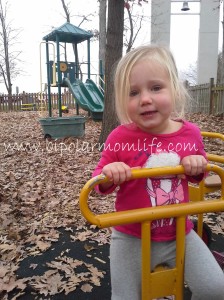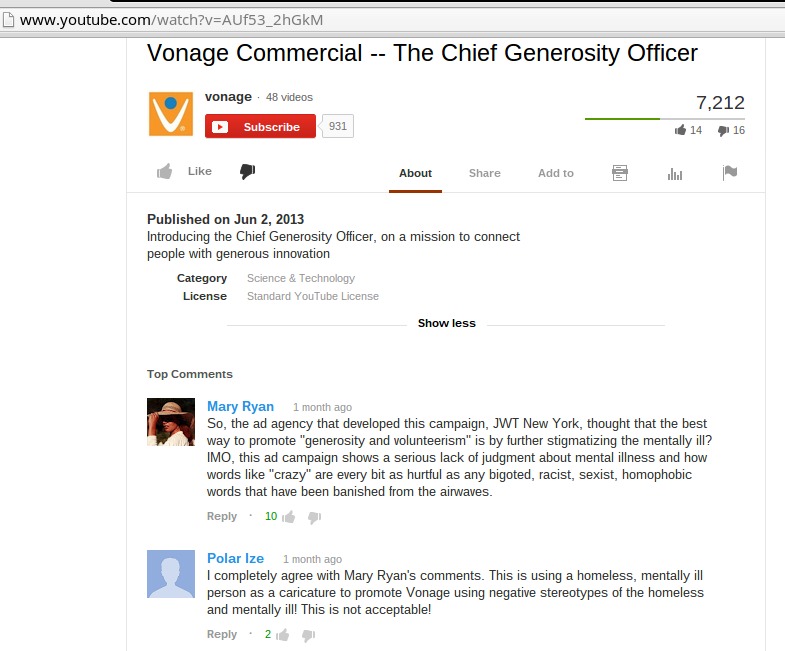“My anxiety spiked as Michael Patrick Jann, the Director of the project welcomed me to the stage. I had listened to the story several times before the event, but in the moment my mind was a blur of nervous energy….”
Read moreClarity. We all need to talk about mental illness, celebrity or otherwise
I've been thinking a lot about the post I published yesterday about my inability to relate to Kristen Bell opening up about her anxiety and depression. I don't know why it struck me to write about my feelings, but I wrote them out and put it out there, and the more I thought about what I wrote, the more I began to disagree with myself.
Sure, it's hard to relate to a celebrity because their lifestyles seem so dramatically different from the average person who struggles to pay bills or isn't able to get appropriate mental health care because they don't have insurance. But this lack of being able to identify with a famous person shouldn't have any impact on my appreciation for their ability to share their story about overcoming mental illness and stigma.
I'm sure it took a great deal of courage for Kristen to open up in that interview, the same way our This Is My Brave cast members conjure up a certain amount of bravery to audition for, and then share their stories on stage through our shows.
I'm embarrassed to admit that I think what I was feeling had more to do with envy than of not being able to empathize with a famous person sharing their story of mental illness. I'm envious that a celebrity has a much bigger platform than we do, and therefore when they share their stories they immediately garner a TON more attention than we've seen for all the hard work our organization has done over the past three years.
One of my favorite writers once wrote about envy, and I found myself re-reading her words today. Glennon reminded me today that: Envy is just unexpressed admiration. It’s respect holding its breath.
I constantly need to remind myself that we need to focus on the important work we do and that when the time is right, I'm confident our organization will attract the attention of national media. In fact, it may begin happening sooner than we thought.
This is my life's work now, this work of storytelling. My organization encourages individuals to share their stories to end the stigma. I have no right to say that a celebrity sharing her story is any less impactful than a member of my own community.
Kristen, blog reader Jill, and anyone else I may have offended from my post yesterday, please accept my apology. Thank you to all who join us in the effort to end stigma, celebrity or not.
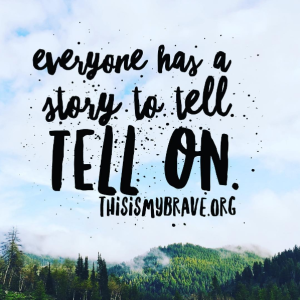
On relating to Kristen Bell's mental illness disclosure
Last week Kristen Bell became the latest Hollywood star to mention that she's not ashamed for taking medication for her anxiety and depression, and the news of her mental illness disclosure went viral. I'm grateful she used her fame to bring awareness to an issue that touches so many of us, but at the same time felt like I couldn't quite relate, even though I've been affected by the same disorders. Listen, I'm all for celebrities sharing their stories. They have platforms much, MUCH, bigger than mine, and the more people who open up, the better. The more attention we can draw to the cause, the better. The more we normalize mental illness, the better.
[embed]https://youtu.be/mYUQ_nlZgWE[/embed]
I guess I just can't really relate to a celebrity. I've never met one myself, although I'd imagine most of them are down to earth. They are human, too, after all. Albeit humans with seemingly endless streams of money, and access to practically any doctor they would ever need to see. They experience mental illness the same way the rest of the population does, only with privilege. Many of them receive the proper diagnosis, effective treatment, and manage their conditions successfully.
On the flip side, no matter how much wealth and access to care they have, some we lose to suicide, like Robin Williams.
Now let me back up for a moment and acknowledge the fact that when I experienced my most serious battles with my mental illness, it was partially my privilege which allowed me to be able to get well. I recognize this.
What I'm trying to say is that to me, when a celebrity goes on camera and talks about having gone through a mental health issue, it's not nearly as impactful as when regular people I meet through my advocacy work share their stories. It's also not the same as a celebrity figure who has made a commitment to fighting the stigma surrounding mental illness by continually sharing her story - the way Demi Lovato has. There's a big difference between mentioning the fact that you take medication for anxiety and depression, and making it part of your purpose in life to educate people.
Also, last time I checked Psychologists weren't licensed to prescribe medication.
When I started this blog my goal was to simply inspire one person not to give up. To let her know that there is life after a mental illness diagnosis and multiple psychiatric hospitalizations. That the months spent crying and sleeping and barely eating because you're so nauseous even the thought of toast turns your stomach, that all those months and maybe even years spent suffering could come to an end.
I truly believe finding other people's stories online helped me to find my recovery path. Which is why when I found the right time to begin writing out my own story, I went for it. I knew that being anonymous wasn't the answer. But at the time I felt a responsibility to my family when making the decision on whether or not to use my real name in my writing. My disclosure would affect them, too, after all.
Then, after eighteen months of blogging, I reached a point where my anonymous writing had reeled in a regular paid blogging gig for WhatToExpect.com, and I wasn't willing to go on without receiving recognition for my work. I wanted to do my part to stand up to stigma, and I knew the best way to do that was come out of the closet about my mental illness. So I did.
And none of my fears came true. The fear of losing friends, of being discriminated upon, of being looked down upon. None. Instead, the response was the complete opposite.
Which is why I am such a strong believer in the power of storytelling. Yes, I come from privilege. But in our This Is My Brave shows there are plenty of people who have come forward to share their stories and they didn't have the same access to care that I did. They still made it out of the darkness. Their stories are extraordinary.
The power behind sharing our stories lies in the ability to comfort others. In our country alone, one in five adults is living with a diagnosable mental illness. We are all affected by it, whether we realize this or not. Mental illness is mostly invisible, and because of both internal and external stigma, and the fear it instills in people, those suffering often times do not reach out for help. They feel isolated, like they are the only one who has ever dealt with that condition.
It's not true. When we share our stories openly, people suffering in silence realize they are not alone. And they see that if someone like them was able to get well, they can too.
Which brings me back to my point about celebrities. Celebrities are people just like you and me. They're human. But given the world they live in, my guess is that it's hard for an average American to relate to their stories.
I urge you to visit our This Is My Brave YouTube Channel where you can view over 100 true, personal stories of overcoming mental illness from regular, everyday people. Teachers, students, small business owners, stay-at-home-moms, community service workers, and the list goes on.
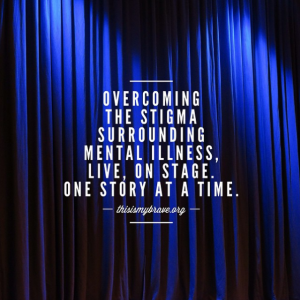
This month, for Mental Health Awareness Month, we have five all-new This Is My Brave shows on the schedule. Our Greenville, South Carolina show was this past Thursday night and it was incredible. Our Iowa City show is this coming Friday night, the third annual DC-area show is this Sunday. And finishing out the month on the same date, May 19th, are our Chicagoland and Denver shows. All our new shows will be added to our YouTube channel this summer.
Deciding to share your own struggle with mental illness is a personal choice. It's This Is My Brave's goal to inspire people to #LiveBrave which means when you're ready, and you find the right opportunity to share your experience with someone, whether privately or publicly, you will. Your ability to be brave will give the other person the comfort and solace they need to feel understood. We've seen it happen through our guest bloggers and our live show presentations. It's life-changing and extremely powerful.
Whether you get that feeling from a celebrity talking about her experience, or someone you know and love in your life, the point is that together we can dissolve the stigma surrounding mental illness by sharing our stories.
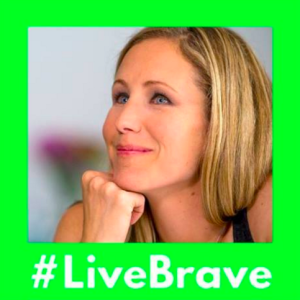 If you decide to #LiveBrave with us, we've designed an overlay you can add to your Facebook profile pic and Twitter profile pic. It's easy, simply follow the instructions here: http://twibbon.com/support/live-brave
If you decide to #LiveBrave with us, we've designed an overlay you can add to your Facebook profile pic and Twitter profile pic. It's easy, simply follow the instructions here: http://twibbon.com/support/live-brave
So long, self-doubt
Why does self-doubt seem to know exactly when to punch you in the gut and knock the breath out of your chest so fiercely that you wonder if what you’re doing with your life is even making an impact?
A month ago I took the greatest risk of my life thus far by launching our Kickstarter for This Is My Brave, and it went above and beyond my wildest expectations. I thought to myself, “Yeah. $6,500 in 31 days is a lofty goal, but I’m fairly confident we’ll get there.”
The love and support that poured out from our friends and family and people who we hadn’t even met in the form of donations and words of encouragement was both overwhelming and exhilarating.
There are so many people who are just as passionate as we are about spreading messages of hope and inspiration while at the same time silencing the stigma surrounding mental illness. We raised over $10,000 for our show’s mission and I felt like we were on top of the world.
But the emotional high I was surfing on came crashing down like a monster wave when the news of the Deeds' family tragedy broke on Tuesday morning. The weight of the story was like a 50-pound brick on my heart. It was all I could think about. I wanted to scream “THIS COULD HAVE BEEN PREVENTED!” to every person I ran into in my daily comings and goings all week.
And then I met someone who understood.
Have you ever had one of those moments when you meet someone new and you can tell after talking with her for five minutes that she just "gets" you and although you were strangers six minutes earlier, it feels as if you've known her for ten years?
It happened to me on Thursday and was the highlight of my day. Once I got my baby girl down for a late nap, I immediately took pen to paper. A piece of me still wants to prove to my mom that she was wrong. That I've received nothing but overwhelmingly positive support for opening up about living with mental illness, especially from the moms at my son's preschool. The very group she thought might shun me. Back then my mom didn't realize that by keeping quiet about what I was going through she was actually adding to the stigma surrounding mental illness. We were all so new to it eight years ago. And I don't blame her for wanting to protect me. She's my mom, and moms don’t ever want anyone to hurt their babies.
We've come a long way since then and both of my parents {and my in-laws} are very supportive of the advocacy work I'm doing now.
This sweet mom whose daughter has been in my son's class all fall, yet I only met this week. She said something to me as we were chasing our toddlers out the door after dropping off our two older kids in front of their classroom. And I know will stick with me forever.
"You must feel such a sense of accomplishment and pride in what you're doing and how many people you're impacting with This Is My Brave."
And do you know what my response was? Of course I later thanked her for her kind words, but my immediate response was, "I feel like I'm not doing enough."
Part of me felt compelled to blog about the self-doubt that crept into my bones this week to remind myself that what I'm doing with This Is My Brave is pretty spectacular. Even though in the wake of the news out of Virginia this week I feel like it's only a teeny sliver of hope. A faint glimmer of the desire to improve the way society and our government deals with mental illness.
At least it's a start.
We talked for an hour while our 3-yr-olds ran around and explored every corner of the playground. I could have talked with her for the entire rest of the afternoon. But alas, the temperature won out and after running around with no coat on, baby girl was adequately frozen and ready to call it quits. I gave my new friend a hug as we said goodbye and I'm already looking forward to our next impromptu playdate with our littles.
While driving home my thoughts drifted to how the sky looked similar to the way it did in late October of 2008 when I was released from my week-long stay in the hospital after having experienced postpartum psychosis. My heart aches for the Deeds family because they weren't able to get the medical attention and treatment that their son so desperately needed. They should have been visiting him in the psychiatric unit of the hospital today, but instead they are planning his funeral.
This isn't right.
We need the laws changed so that we can protect these individuals from themselves and others when they are so ill. And we need nets, as my friend Glennon so vividly described in this post. We need so many nets.
This Is My Brave is my effort to create a net.
And although I know that I want my next step to be petitioning our government for changes to our mental health system, my focus right now is on this show, my heartfelt contribution to changing the way people feel about mental illness.
And hopefully, in turn, it will inspire people to come together and create actions which will facilitate the change we so desperately need.
Staying Brave During the Holidays
I met Pauline Campos through social media. Her tweets are funny, outrageous, smart, and inspirational. She is a columnist for Latina Magazine, authors her own blog - AspiringMama.com, and the Founder of GirlBodyPride.com, a blog dedicated to helping women to grow strong in mind before all else. She lives with ADHD and works to help eliminate the stigma surrounding all types of mental illness through her writing and her outreach.
I love this about Pauline: "But when it all comes down to it, I’m a mom trying to reach out to other moms." {quoted from the Platform page of AspiringMama.com}
Pauline did just that, and offered to make a video clip for Anne Marie and I on why she believe in our show, This Is My Brave and the Kickstarter we're currently running. She spoke on our Update video and also pledged a generous donation to our project. We couldn't thank her enough for her support. But she didn't stop there.
Pauline accepted a guest post I wrote for her blog, GirlBodyPride, and it went live today. Thank you so much for allowing me to share my story and our project on your blog today, Pauline! Your support for This Is My Brave is beautiful and so appreciated.
The holidays are coming up and for me this time of year is always bittersweet. The end of October marks the anniversary of my postpartum psychosis experience. Leaves changing to shades of yellow, orange and red, combined with the smell of real wood-burning fireplaces in our neighborhood on a chilly night can take me right back to that place of fear and disbelief buried deep within my memory.
Why me? Why did it have to happen to me?
I try to focus on the excitement of my kids deciding what they want to dress up as for Halloween and the carving of our pumpkins, turning them into...{to read the rest of the post, please click over to GirlBodyPride. Thanks so much for reading and Happy Halloween!}
What's Your Definition of Crazy?
When you think of the word crazy, what comes to mind?
Yesterday, my friend Natalie and I were walking down the streets of DC, on our way to see Mary Leaphart’s show about her life with bipolar disorder. As we made our way to the ticket venue, we passed two men on the street, one shouting violently at the other, yelling something about needing to move. It was obvious they called the city sidewalk home, as we could see their belongings piled up next to the man who was sitting on a wool blanket, and there was a good chance one, or both, suffered from a mental illness. I know because I’ve read the statistics.
It broke my heart.
Later, while walking into a restaurant, we were approached by another homeless man, this time asking for money. He was wearing an old, stained jacket, despite the intense, muggy July heat. A woman, dirty and weary, sat on the street corner begging with her eyes, tattered luggage in a heap beside her.
The despair was written on her face, her slumped shoulders spoke her story. Her melancholy eyes will haunt me forever, my soul crying tears of compassion.
This is the harsh reality of mental illness and homelessness in our country.
It’s unfortunate that a well-known US brand chose to market themselves by exploiting these serious issues, turning them into a parody, the leading character who they claim as their Chief Generosity Officer, “a brilliant activist” {their words, not mine} who just happened to be plucked off the streets where he was shouting at people walking by. He’s dressed in ill-fitting clothes and looks as if his hair and beard, both overgrown, haven’t been washed in weeks.
Please, enlighten yourself if you haven’t seen the spot yet: http://youtu.be/AUf53_2hGkM
These brushes with homelessness yesterday were ironic, given the conversation I had just hours earlier with Barbara Goodstein, Vonage’s Chief Marketing Officer, regarding their new “Crazy Generous”-themed ad campaign.
You see, the 30-second spot left such a bad taste in my mouth that I sent an email to Vonage on Monday to voice my disappointment and frustration with the commercial.
I wrote them to express how hurt I was by the campaign, given the fact that I live with a mental illness and I know how scary that can be. I cannot imagine having to sort through the voices in your head without any psychiatric care, while sleeping in a cardboard box, no support from family or friends.
I’ve been blessed with an incredible support network, without which, I could easily have ended up on the streets. When I became sick for the first time, I had to resign from my job. It’s painful to think about what could have happened had I not had my husband, family and friends there to help me navigate my way back to healthy. Not to mention the health insurance I had which helped to cover the cost of getting well.
Homeless people with mental illnesses don’t have such luxuries.
Whenever I walk down the streets of a city, I inevitably pass a homeless person and each and every time have the same gut reaction: uneasy pangs of guilt.
Why am I the lucky one with a roof over her head and food in the refrigerator?
The advocate in me always wants to do something, anything, to help. To help that person get out of the situation they’re in, and into a better one.
The letter was something I thought I could do to help. Or at least I could voice my opinion and make sure I was heard. Besides, I wasn’t the only person who was offended:
{click to enlarge}
To my surprise, Vonage did respond. I had the opportunity to speak with Barbara Goodstein, yesterday afternoon and I took her up on the chance to discuss the campaign in more detail.
What she told me did not change my opinion and reaction to the campaign. She simply and politely reiterated everything she had explained in her response to my original email. To me, Vonage appears to be backpedaling to justify their creative concept which was intended to show how generous their company is with their communications services.
Their message was lost on me because I couldn’t get past the fact they were using a homeless person who may or may not be battling a mental illness as a lighthearted attempt to deliver their company tag line.
I told Barbara my story of how stigma affected how I shared my story. How I blogged anonymously for the first year and a half because I was afraid of people calling me “crazy” for having suffered a manic break. Four, actually. And how I finally decided to do my part to end the stigma by coming out as myself. Showing my face and using my real name because I’m not ashamed any more.
cra·zy {as defined by Dictionary.com}
[krey-zee] Show IPA adjective, cra·zi·er, cra·zi·est, noun, plural cra·zies.
adjective
1. mentally deranged; demented; insane.
By using the word crazy in their campaign, Vonage has pointedly decided to ignore the fact that the first definition of crazy is exactly what came across via their Chief Generosity Officer character, whether they choose to admit it or not.
Vonage can try as they may to make it look all funny and cute and they can wrap it up with a happy ending, but that isn’t the reality of living on the streets. This ridiculous ad pokes fun at the serious, chronic issue of homelessness and the struggles homeless people have with mental health in this country. By producing this “Chief Generosity Officer” character, they are only adding to the stigma that surrounds mental illness in the U.S.
You want to know what the truth is?
The truth is that there are over 675,000 homeless people in the United States and approximately 45% of those people report mental health problems. About 25% of the homeless population suffers from a serious mental illness.*
And even if you take the mental health component completely out of the picture, Vonage still created a character out of one of the darkest corners of the society we live in. There is nothing generous about downplaying the issue of homelessness.
The sad truth is that most Americans ignore homeless people on the streets, turning their heads to the sight of someone sleeping on a park bench or in a dark corner. The homeless population is invisible to us, not because we don’t care, but because it’s painful to acknowledge it could be us had our life situations played out differently.
What can Vonage and J. Walter Thompson do to apologize for the insensitivity of the campaign?
For a start, they could stop running the ads immediately, cancel the campaign and apologize.
But I’m realistic. I understand they have millions invested here and I’m only one person voicing her opinion. I’m only asking them to have a little compassion.
So here’s a thought. If they really want to be crazy generous, I’d love to see Vonage make a donation to a charitable organization dedicated to changing the way people think about homelessness, such as the National Alliance to End Homelessness (www.naeh.org) so they can further their efforts at ending this social problem across our country.
Vonage should admit their lack of foresight by publicly apologizing for trivializing issues as serious as homelessness and mental illness. Individuals who live on the streets are real people with real feelings, emotions, and stories. They didn’t ask to sleep in a flimsy cardboard box or on a rock hard park bench. They ended up homeless for a variety of reasons, but whatever their reason for ending up on the streets, it doesn’t make them any less human than anyone else.
Vonage has an opportunity to turn a wrong into a right. It would be crazy if they were to turn their heads instead.
*Facts on homelessness were taken from the National Alliance to End Homelessness (www.endhomelessness.org).
Imagine: Five Minute Friday {9}
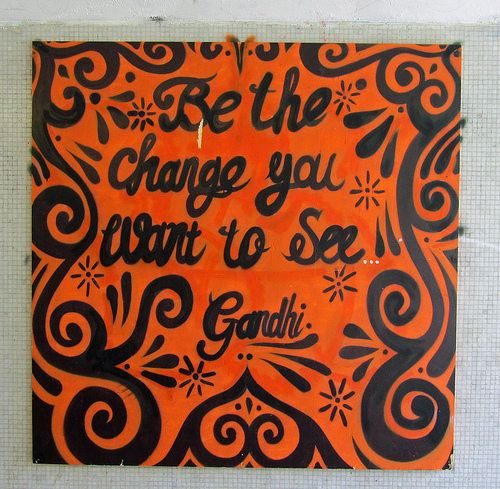 Photo credit: cocabeenslinky via Compfight cc
Photo credit: cocabeenslinky via Compfight cc
Imagine a world void of stigma. A place where we’re all supportive of each other’s uniqueness. Imagine embracing mental illness rather than ostracizing and shaming people who did nothing to ask for the condition they’re living with, other than be born. Imagine supportive love, a constant shoulder to lean on or ear to listen when times get tough, healing words which encourage. This is how I imagine life in the future. The very near future.
When I imagine a world without stigma, my heart relaxes and smiles with gratitude.
No regrets
 Last week was pretty surreal.
The outpouring of support from my friends and family surrounded me by way of emails, phone calls, text messages and blog comments. From 8:30am until 10pm. All the conversations about my decision to go public with my illness made my heart swell with gratitude. So much gratitude.
Last week was pretty surreal.
The outpouring of support from my friends and family surrounded me by way of emails, phone calls, text messages and blog comments. From 8:30am until 10pm. All the conversations about my decision to go public with my illness made my heart swell with gratitude. So much gratitude.
But there were two people who were quietly sitting back at home, taking it all in. Without saying a word.
Glued to my computer, watching the discussions take place in real time before my eyes, I longed for their approval in some shape or form. I waited for their number and picture to show up on my phone. The hours flew by and all of a sudden I looked at the clock and realized the day was over. The call never came.
Sometimes when someone is silent, their message comes across loud and clear.
I knew that my choice of words describing their reaction to my diagnosis might have hurt them. But that wasn't at all my intention. I only wanted to take my readers back to those moments when the shock of it all was still so raw for my family and I. After months of not seeing the light, the daze lifted to expose sheer exhaustion. We were all so worn out from the intense stress of trying to figure out what the hell was going on with me. So tired and drained - both physically and mentally - between the three of us we had cried so many tears that our eyes had nothing left to release, though we probably kept dabbing at them with wet tissues.
My mom and dad have a depth to their faith that I have yet to find. I admire that in them. I hope to some day reach that level of connection to God. They both prayed so hard during that year when we didn't know what else to do or where else to go to help me get well. The days crept by so slowly. Tears fell continuously. They had already spent most of their time researching doctors, medications, treatments, alternative medicine, research studies. Anything that could potentially bring me back from the dark hole I had dropped into. Anything that could fix me. A miracle seemed so out of reach and yet they kept on reaching, kept on praying. Praying and reaching for me because I had lost my will to reach myself.
Whether they know it or not, every night I thank God that they had the strength to keep on praying because their prayers were answered.
I probably could have used a better word than "mortified" when I described my perceptions of how they felt about my mental illness diagnosis. That wasn't fair. Fear and bewilderment probably would have been much better representations of their emotional state back then. They've wanted me to hold onto my anonymity because they worry about me the same way any parent worries about their child. I am an adult and I could have made the decision to blog openly about my illness a long time ago and I decided not to. But that changed recently. I've finally reached a point in my life where I don't want to look back and have any regrets. I don't want to wish I had done it earlier. I wasn't able to do it before now. I wasn't ready.
The fact is, parents will worry about their kids no matter what decisions they choose to make in life. That's just the nature of being a parent. So whether I made the choice to go public and become an advocate as I did this week, or I remained anonymous in my attempt to inspire other people living with bipolar disorder through my writing, my parents would have kept on worrying about me, either way. It's part of the job description when you're hired on as a parent: perpetual worry. Just comes with the territory.
I've only been a parent for less than five years, but with many more years ahead of me, I can only imagine how much harder it gets. Thank you, Mom and Dad. Thank you for loving me unconditionally they way you both always have. Thank you for supporting me and for encouraging me to keep writing. And thank you for being there to listen. Even if you may not completely agree with my decision to take this leap.
I love you both so much.
My Time to Stand Up to Stigma
“I’m ready to not be anonymous anymore.” I said, tensing up slightly at the sound of my voice.
Even as that statement came out of my mouth two months ago at my Listen To Your Mother DC audition, I didn’t yet fully believe what I was saying. I still saw the faces of my parents in my head, grimacing at the reverberations of my words. I sensed a dark hook pulling me back into my closet of shame. It took a trip to the opposite coast for a long weekend at a writers’ retreat a few weeks later to demonstrate to me why I no longer need to hide.
I think the shame stems from my upbringing. In fact, I know it does. My family culture taught me that we don’t air our dirty laundry. That we should never appear vulnerable for fear of appearing weak.
When I was diagnosed with Bipolar Disorder in the spring of 2006, my Mom and I took long walks around the townhouse community where my husband and I lived at the time. She led me in praying the rosary. I followed along, because at the time I had no idea what else to do. At the time we grasped at whatever made us feel better. Or she did, at least. I was pretty numb from all the meds I took. And so I just repeated the prayers, over and over again, like the good little Catholic daughter I appeared to be. What she wanted me to be. Not her daughter who just found out she has a mental illness.
In going through treatment and therapy, I hid mainly, curled up in my closet of shame. I felt embarrassed and ashamed that I had suffered two manic breaks, both of which hit me out of nowhere and forced me to spend almost a week in a psych ward to be brought back to reality. My hospitalizations were traumatic and harrowing, from the injections of anti-psychotics that I received, to the night I spent in the isolation room because I thought my roommate was a monster. I had no one to talk to about the torment it caused me. Only my closest three girlfriends knew that I had been grappling with a psychiatric illness. They were there for me, but only so much as they could be. So much went unsaid, for fear of feelings being hurt. My world had been rocked to the core, and my personality had crumbled in humiliation. Because of the sudden shock of it all, I experienced severe anxiety attacks and subsequently had to resign from a job which I loved and excelled at.
In the course of four months I had gone from the peak of my career as a rock-star recruiter, pulling in six figures at the tender age of twenty-six, to the darkest, most desolate time in my life. I felt so alone, despite the fact that my parents and husband were doing everything in their power to figure out what would get me well. They listened when I cried practically every day for nine months straight. My husband wrapped his strong loving arms around my frail body each and every night in bed so that I could turn off the racing thoughts and fall asleep to the sound of his steady heartbeat. I am forever grateful to them for staying positive and focusing on the end goal of getting me to see that it didn’t have to be this way. That life was worth living. Because I couldn’t see further than a step ahead of me back then.
We took things one day at a time in 2006, only consulting with our closest friends and family in the times when we needed extra help or advice. After several months of seeing and hearing me struggle with suicidal thoughts, my parents were desperate to find a doctor who could prescribe the right meds to bring their bubbly, confident, smart daughter back. She had all but disappeared and by this point they were ready to do anything to prevent me from taking my own life.
The thoughts of killing myself were only fleeting thoughts, bouncing in and out of my brain. My head was overflowing with chemicals from the drugs I was on, that I sometimes wondered if the thoughts were a product of my meds. The morbid curiosity I was struggling with made it tough for me to connect regular, day-to-day thoughts like, “I wonder what I should make for dinner tonight?” or “How many minutes do I want to sweat on the treadmill today?” In my messed up reality I felt like I didn’t have anything to live for anymore. A very selfish part of me thought my pain would magically disappear if I just swallowed a bottle of pills. It was as if I were trudging through thick, gooey mud in my depressed mind every day when all I longed for was the ability to return to normal.
By some miracle of God (or maybe my Mom’s rosary prayers were finally answered), my Dad was able to get me an appointment with the Chief of Psychiatry at the National Institute of Health in Bethesda, MD, near where I lived. That meeting, on a warm October evening the day before Halloween, was a night I’ll never forget.
Dr. Post explained why Lithium was a good choice for me and that I should be open to giving it a try. He listened to my fears and addressed all of my concerns. He even gave us his notes from that meeting. I cried hard as I confessed my extreme grief at not being able to have children because I’d be taking Lithium for the rest of my life. Dr. Post assured me that this simply wasn’t the case. I would just have to work closely with my doctors before, during, and after the pregnancy and I could even stay on my medication - in fact, he strongly recommended that I do - since the risk of birth defects while on Lithium is so low. The benefits of staying on medication during the pregnancy and after, foregoing breastfeeding, greatly outweighed the risks of not taking the meds.
Within three months on my new medication, I began to feel my old self emerging like cheery daffodils poking through the cold, wet spring soil. But instead of opening up and telling our friends and family how happy we were that I was starting to feel better, my Mom kept praying on those beads, and mouths were kept shut. The whispers shared between the family regarding my health continued, even as I began to surrender to my desire to share my feelings of what it was like living with a mental illness. The writer in me just wanted to be able to talk openly about how I was working hard to get well. I wanted to show the world that I had been through hell and back and I turned out okay. In fact, I was better than okay. I was ready to start writing my story. I started my blog, Bipolar Mom Life, but was gently encouraged by my family to keep my identity a secret, so as not to jeopardize future employment opportunities or my relationships with our neighbors or people in the community. And so for nearly two years I remained a prisoner of my parent’s mortification over the illness, complete with hands in cuffs and duct tape over my lips.
It’s been seven years since I was handed my admission into the club of mental health consumers. We’ve had two healthy kids and I’ve had two more hospitalizations, both times because I put my babies’ health before mine. They are my world, along with their Daddy. It only took me seven years and a few months from my first manic episode to figure out that I’m going to be okay. That I don’t have to hide anymore. That if I can help just one person by sharing my story then it’s worth it.
I’m ready to not be anonymous anymore.
I want to show my kids that it’s important to stand up for what they believe in. If not, then why are we here? I believe that having a mental illness should never stand in the way of anyone’s dreams. I believe we need to educate the world about the various types of mental illnesses so that more friends and family, co-workers and teachers can reach out to those who need help so that they can get the care they need. I believe in standing up, showing up, and writing my way through living with a mental illness. It does not define me as a person; it’s just one aspect of my life which has helped shape me into the person I’ve turned out to be. And I’m pretty damn proud of her.
Yesterday I took off the anonymous mask, and emerged from my closet of shame. My voice, my words, my story - they deserve to be told with my real name.
My time to stand up to stigma is now.
Kicking Bipolar's Ass
I cringe every time I hear these words, or see them typed out in print or online somewhere like I did today. You would never hear, "She is cancer." Instead, after someone is cured of cancer you hear, "She BEAT cancer."
That is so wonderful. I cheer along with everyone else when I read of someone's victorious fight with the devil that is cancer. If you think about it, mental illness should be looked at the same way. I don't want to be known as the woman who is bipolar and is married with two kids.
I didn't ask for this condition, this heartbreaking, terrifying, complicated illness, to hit me at the age of twenty-six when I was newly married and at the peak of my recruiting career.
And I am not my illness.
I am so much more than this condition I live with and manage each and every day.
I am a wife. A mother. A daughter. A sister. A granddaughter. A niece. A cousin. An aunt. A friend. An employee. A room mom. A church member. A Sunday school teacher. A writer. A reader. A bubble bath-taker. A coffee lover. A vegetarian. A chocoholic. A fan of music. A dancer. A car singer.
You know, the type that knows every word to every song and loves to sing no matter how bad of a singer she is. Yeah. That's me.
I am the sum of all these beautiful, wonderful things.
I am NOT Bipolar.
I may have bipolar disorder, but it does not define me. I am defined by the people I surround myself with, the people who I love and who also love me for who I am. The ways I spend my time help to mold me into the person I am becoming.
And I'm pretty happy with her. Most of the time.
Don't get me wrong, I have plenty of growing and learning to do. But I do think that I can be proud of how far I've come.
I turned 34 last month. I recently commented to my best friends how it seems like a third of our lives is gone already. They both reminded me that we'd have to live to 102 for that to be the case. Hey, it's possible. But I guess they're right. More than a third is done. Lived. In the books. {or, on the blog.}
Sometimes I wonder where all that time went.
I'm not sure, but I do know that I want to be able to say, for the rest of whatever time I have left, that I beat bipolar disorder. That I was an inspiration to others still fighting. And that I did my best.
I think I'm doing a decent job so far.
A "deficiency" or mental illness?
I was discussing my blog with my father over the weekend because I was still torn over the issue of whether or not to disclose my true identity in my writing. He and I both agree on the point that there is an incredible amount of stigma still attached to the label of bipolar in our society, and then he said something that really made me think. He told me that he doesn't consider me to have a mental illness, per say, he feels that I simply have a "deficiency in my brain chemistry" which causes me to become psychologically impaired during times when I am unmedicated. Humph. Good point Dad. Especially because all three of my hospitalizations prior to the first where we had no clue that I was Bipolar, happened when I was not on my medications.
But are you saying this simply so that you do not have to be constantly reminded that your child has a psychiatric condition? I guess "deficiency" just makes it feel better.
I mean, I see your reasoning. And it does make sense. It is true that I really only require a small amount of Lithium to function at a completely normal level. So, as long as I take my meds (which I do religiously - my past has taught me some very valuable lessons, let me tell you) I'm normal. Balanced. Sane.
Not mentally ill.
History has proven for me that within a week of going off my medication, I'm spinning out of control and am clinically psychotic. It takes a couple of weeks on anti-psychotics to bring me back to the middle.
So yeah, I guess you could say that my brain is deficient. It's so weird to me that all it takes to keep me normal is a small amount of a naturally occurring salt. When I looked up Lithium Carbonate on Wikipedia, I wasn't surprised to read this:
Upon ingestion, lithium becomes widely distributed in the central nervous system and interacts with a number of neurotransmitters and receptors, decreasing norepinephrine release and increasing serotonin synthesis.
After my most recent hospitalization, I was released to the care of my regular psychiatrist who had been helping me try to stay off Lithium during the pregnancy since I wanted to be medication-free for the first trimester to give the heart time to form without being exposed to Lithium. At my first appointment with her post-hospital, she and I agreed to continue using the anti-psychotic, but to try to stay away from the Lithium as long as possible. That next month was really hard. I literally had trouble putting words together to form sentences. I couldn't talk right. I jumbled my speech. I couldn't write with a pen and paper. I avoided my friends because I didn't want them to see me that way. I remember telling my psychiatrist, months later once I was stabilized again on Lithium, that at the time it felt like the neurons in my brain were broken, they weren't firing the way they should have been so that I could think and make sense of things. It was awful. I needed Lithium in my blood.
I specifically remember the morning that I called my high-risk OB-GYN to tell him I had recently come home from a hospitalization. I told him I wanted to stay off the Lithium for the first trimester, but he said it sounded like I needed it. That was when I made the decision to go back on it. It was a good decision. The benefits outweighed the risks.
But back to my original topic - deficiency or mental illness? I don't know. I'm still torn on this. Bipolar Disorder is a mental illness which people live with their entire lives. Just like heart disease, once diagnosed, is a condition that a person lives with the rest of their life. Sure, there is a deficiency in my brain chemistry that when treated allows me to function at a normal level. But that doesn't mean that I don't live with this diagnosis for the rest of my life. I still think about it about twenty times a day, on an average day. And if I don't take my meds, or they suddenly stop working for me, then yes, I will become mentally ill.
It's just that 99.8% of my life has been spent not feeling mentally ill. And I'd like it to stay that way.
What's your take?



